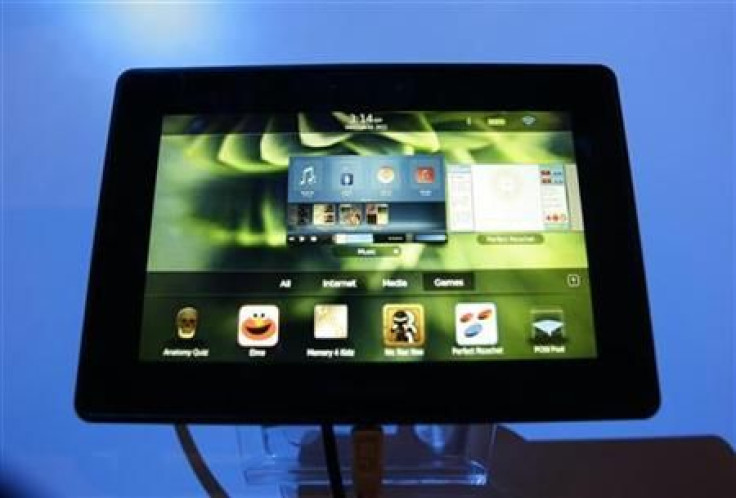RIM Killing BlackBerry PlayBook Tablet: Report

Research in Motion is giving up on its BlackBerry PlayBook tablet, according to a report.
Based in Canada, Research in Motion has struggled with slow sales of its new PlayBook tablet, as the company struggles simultaneously with sinking sales of its BlackBerry smartphones. Apple's iPad is the global tablet leader, and Apple has also dealt a blow to RIM's BlackBerry phones in recent years, taking command of global marketshare.
But the demise of the PlayBook may have been dealt its ultimate fatal hand from Wednesday's unveiling from Amazon of the company's first tablet, the Amazon Kindle Fire, to be released Nov. 15 and priced at $199.
Collins Stewart analyst John Vinh claims in a note to investors Thursday, citing anonymous sources, that RIM has stopped production of its BlackBerry PlayBook tablet and is considering getting out of the space all together. Vinh cited a source at RIM's manufacturing partner Quanta, which makes its PlayBook tablet.
While Quanta last week acknowledged that it had laid off a significant number of production workers from a factory focused on producing the PlayBook, our research indicates that the ODM has essentially halted production of the tablet, Vinh wrote.
Additionally, our due diligence indicates that RIMM has canceled development of additional tablet projects. The move would be drastic, but hardly unforeseen; RIM shipped 500,000 PlayBook tablets in the slate's launch quarter, and only 200,000 more during its first full quarter of availability. Multiple analysts have anticipated the PlayBook's demise, and it appears as though they may have been right. RIM launched its BlackBerry PlayBook tablet on April 19th of this year.
A RIM spokesperson denied the report, according to BGR, which broke the news Thursday.
Only weeks after launching its TouchPad tablet amid high promises and hefty retail stocking to partners including Best Buy, HP faced news that its tablet was barely selling at all while some retailers wanted to return extra stock. Days after that news, HP announced it was discontinuing support for its TouchPad tablet and having a fire sale for the product -- selling models for $99 and up. The TouchPad immediately sold out at the fire sale prices.
Last week The Guardian cited an analyst at Fubon Securities who says that RIM's PlayBook tablet supplier, Quanta Computer, had shipped 1.5 million PlayBooks to RIM in the first half of the year. But RIM has reportedly only shipped 700,000 PlayBooks to retail partners.
The dilemma is different than what HP faced, since that company had retailers sitting on tens of thousands of the slow-selling units at full price when it walked away from the TouchPad. But if the math is correct, then RIM is sitting on roughly 800,000 PlayBooks as product sales have slowed.
Already retailers are beginning to discount the PlayBook, doing as HP did initially with a slight discount compared with a fire sale discount. Staples began cutting prices on RIM PlayBook tablets earlier this month, selling 16GB versions for $449. Staples also faced overstock from the TouchPad before the fire sale discount.
Some industry observers think RIM may soon drop its PlayBook to HP's TouchPad $99 fire sale level, as another report this week suggested that RIM is fast-losing marketshare in the U.S. for its BlackBerry smartphones -- faster than many anticipated.
RIM's PlayBook failed to garner early support from many consumers because the product was launched without its own access to email, contacts and calendar -- relying upon connection with a BlackBerry for the services. Now, with new, lower-priced competition from Amazon's forthcoming Kindle Fire, the end for the BlackBerry PlayBook may be near.
© Copyright IBTimes 2024. All rights reserved.











